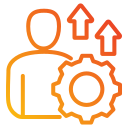Learning in Public Builds Credibility
Curate three to five projects that demonstrate skills employers ask for. Write clear problem statements, show your process, and quantify outcomes. A thoughtful readme or case study often speaks louder than a polished but unexplained final result.
Learning in Public Builds Credibility
Release bite sized work weekly, not perfect work rarely. A mini data analysis, a one page UX case, or a short tutorial compounds. Consistency signals reliability, and momentum beats perfection when you are building professional skills after graduation.







